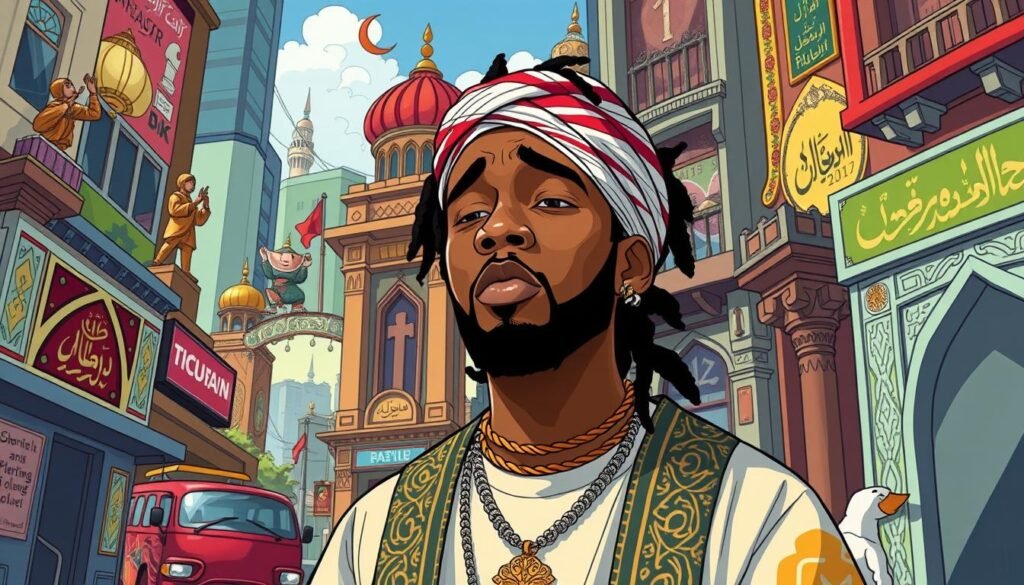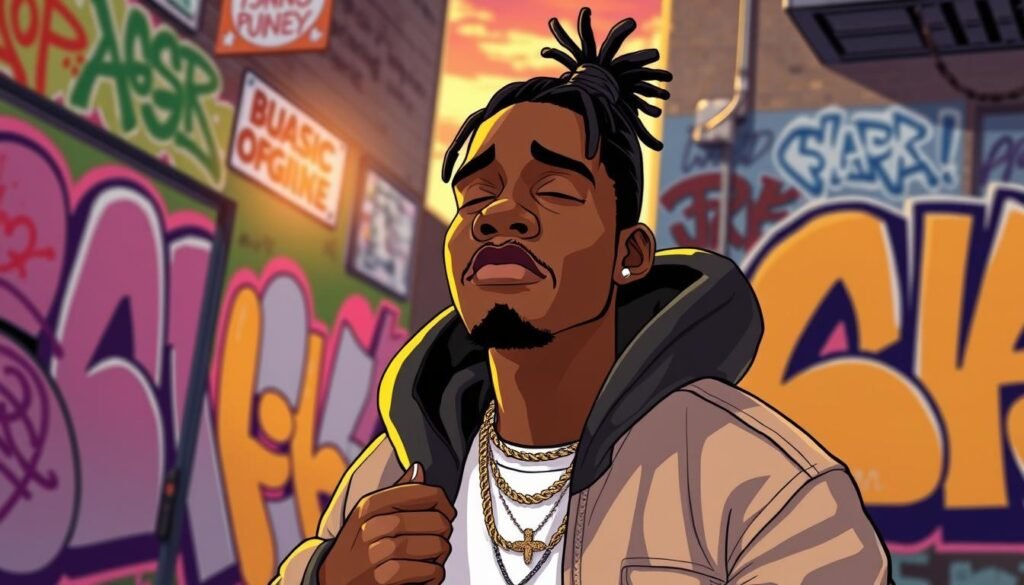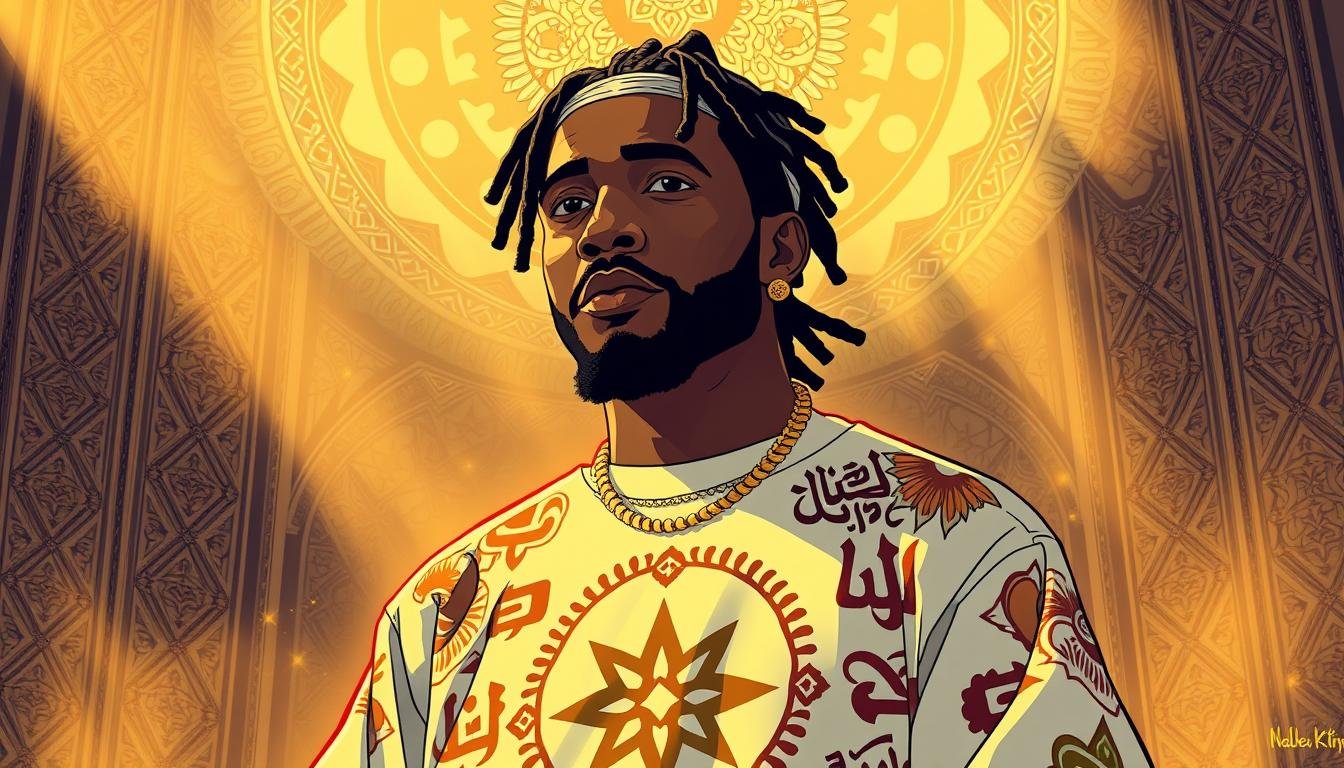As the global Muslim population is expected to reach nearly 3 billion by 2060, I wonder if A$AP Rocky is Muslim. He is a top figure in hip-hop. The question of his religion has made fans and media curious.
It’s not just about his beliefs. It’s also about how they fit into a culture with more Muslim artists. We will explore A$AP Rocky’s background and the role of religion in hip-hop. Could there be more to his story than we see?
Understanding Asap Rocky’s Background
A$AP Rocky, born Rakim Athelaston Mayers on October 3, 1988, in New York City, grew up in a tough A$AP Rocky upbringing. He faced many challenges, especially after losing his older brother, Ricky. This loss deeply affected him and shaped his music.
He joined the A$AP Mob in 2007. Music became his escape from the tough streets of the city.
The A$AP Rocky family was also a big part of his life. His dad, Adrian, was in jail for drugs, and his mom, Renee Black, had money troubles. They moved a lot, from Harlem to the Bronx and other places. This made Rocky strong and showed him the hard side of city life.
His sister, Erica, was always there for him. She supported him as he followed his dreams in music.
Rocky’s success, like his hit mixtape Live. Love. A$AP, shows how his past shaped him. His story is full of real experiences and authenticity.
The Influence of Religion in Hip-Hop Culture
Religion is a big deal in hip-hop culture. It’s all about identity, empowerment, and fighting for justice. Many artists use their faith to share their stories and speak out against wrongs. Islam is especially important in hip-hop, especially for Black artists looking for deep messages in their music.
Hip-hop started in the 1970s in the Bronx. It was shaped by African-American and Latin American cultures. Many African Americans felt Christianity was tied to white oppression. So, they turned to Islam as a way to find strength and identity.
Early hip-hop stars like Afrika Bambaataa were influenced by Islam. They mixed hip-hop with Islamic teachings. Later, artists explored Sunni Islam, adding more Islamic ideas to the genre.
Stars like Jay-Z, Nas, and Kendrick Lamar use Islamic imagery in their songs. They talk about justice and mix spirituality with criticism. Songs like Kanye West’s “Jesus Walks” and Chance the Rapper’s “Coloring Book” show how faith is woven into hip-hop. They connect with fans who want more than just music.
Is Asap Rocky Muslim?
Debates about A$AP Rocky’s spiritual life keep popping up. This has led to rumors about him being Muslim. But, the rapper has never said he follows a specific religion.
This mystery makes us think more about his faith and its role in hip-hop. A$AP Rocky’s songs mix his life stories with cultural thoughts. Yet, his music doesn’t clearly show Islamic themes. This might explain why people are still unsure about his religious beliefs.
It’s interesting that the number of Muslim rappers in hip-hop is growing. Artists like Lupe Fiasco and Yasiin Bey have talked openly about their Islam. A$AP Rocky’s unclear beliefs offer a chance to look at how artists’ stories are shaped.
How do we connect A$AP Rocky’s personal life with the stories told about his faith? This question is key to understanding his place in music.

Rumors and Speculation Surrounding Asap Rocky’s Faith
People often wonder about A$AP Rocky’s faith. His work in hip-hop makes fans curious about his religious side. They think about his name, Rakim, and its deep cultural meaning.
Fans and the media try to figure out if A$AP Rocky’s public image shows his faith. Some think he might be Muslim, but it’s not clear. A$AP Rocky wants to keep his beliefs private, like many celebrities do.
A$AP Rocky’s situation shows how faith and fame can mix. He faces a lot of attention but doesn’t share much about his faith. This mystery makes people even more curious about him in the hip-hop world.
The Connection Between Islam and Other Rappers
Islam in hip-hop is more than just A$AP Rocky. Many Muslim rappers share their faith through music. Artists like Ice Cube and Jay Electronica mix Islamic beliefs with their stories.
This mix shows how hip-hop talks about big themes like faith and justice. It’s a space for deep conversations.
These rappers’ music includes Islamic prayers and thoughts. It adds to hip-hop’s rich culture. It also helps break down stereotypes and shows Islamic culture in a new light.
Even with some disagreements, hip-hop and religion keep working together. It leads to talks about artists’ faith and how it influences their music. This connection is a deep dive into culture that many people find interesting.
Asap Rocky’s Public Image and Religion
A$AP Rocky’s image is all about identity, style, and culture. His faith is not often talked about. He loves fashion, art, and lifestyle, but faith is a mystery.
How does the public see A$AP Rocky’s faith? It’s a big question. His faith is not clear, and that’s interesting.
A$AP Rocky’s faith is complex, like many artists today. They face challenges in showing their true selves. His views on faith are not clear, making us think more about him.
His relationship with Rihanna adds to the faith and identity talk. They both keep their personal lives private while being in the public eye. It makes us think about how faith affects their actions and how we see them.

Famous Rappers Who Practice Islam
Many Muslim rappers have come to light in recent years. They show how Islam shapes their music and lives. Stars like Lupe Fiasco, Busta Rhymes, and Swizz Beatz share their faith through their songs. They inspire others by showing how faith can shape art.
But it’s not just Muslim rappers who bring up faith in hip-hop. Christian rapper John Gabbana has also joined the conversation. He talked about celebrities converting to Islam, sparking a debate about their true beliefs.
Islamic themes in hip-hop show the genre’s depth. The Zulu Nation of the ’80s helped artists like Mos Def use Quranic verses in their songs. His album starts with “Bismillah ir Rahman ir Raheem,” showing his respect for Islam. Even non-Muslim artists like ASAP Ferg and Drake have included Islamic references in their music, showing appreciation for different cultures.
This mix of cultures raises important questions. Artists like French Montana and Krept have faced criticism for their Islamic themes. But hip-hop keeps growing, embracing many cultures. This allows faith to inspire creativity, leading to deeper understanding of artists and their stories.
The Role of Islam in Hip-Hop’s Social Justice Narrative
Islam’s history with the Black liberation movement is key to understanding hip-hop social justice. Many hip-hop artists find inspiration in figures like Malcolm X. Their teachings deeply influence their music.
This Islam music influence pushes artists to talk about big issues. It creates a space for discussions on race, inequality, and justice.
In hip-hop, the fight for civil rights is shown through powerful songs. For example, J. Cole’s “KOD” and Kendrick Lamar’s “Swimming Pools” tackle tough topics. These songs reach many people and share the struggles of marginalized groups.
Artists use their music to speak out and bring people together. This mix of music and activism is a big part of hip-hop’s role in changing society. With hip-hop growing fast and reaching far, artists and communities worldwide share common goals.
Themes of justice, equality, and fighting against oppression are heard everywhere. This is seen in the support for Black Lives Matter and other global movements, including those of Muslims in the Middle East.
Asap Rocky’s Lyrics and Possible Religious References
Asap Rocky’s songs cover many themes, showing his life and the world he sees. His lyrics mix stories of love, loss, and street life. There’s a big question about his religious views, especially Islam, since he doesn’t mention it much.
A$AP Rocky’s songs hint at spirituality, but not often. About 14% of his songs talk about beliefs, with Islam mentioned once in every seven songs. This is less than other hip-hop artists.
Looking closer, Islamic themes make up 70% of his spiritual mentions. This shows Asap Rocky’s work is complex, even if he doesn’t talk about religion directly. It makes us wonder about his spiritual side and how it fits into hip-hop culture.
Interviews: Asap Rocky on Religion and Beliefs
A$AP Rocky talks about religion in interviews. He answers questions about faith and beliefs. But he keeps his personal beliefs private.
Being a celebrity and spiritual can be tough. Artists often struggle with sharing their beliefs. They want to stay true to themselves but also meet public expectations.
This struggle shows how complex fame can be. It’s about finding a balance between personal and public life. This balance is key in hip-hop, where spirituality meets creativity.
Conclusion: The Importance of Respecting Privacy in Celebrity Lives
In the world of celebrity culture, it’s key to remember that curiosity about A$AP Rocky’s religion is important. Yet, it must not overshadow the need to respect public figures. Everyone, including A$AP Rocky, has the right to keep their personal beliefs private.
Rumors about celebrities’ lives, especially their relationships and faith, can be overwhelming. Social media makes it hard to keep their privacy. For example, a Twitter thread about Paris Fashion Week shows how fast false information can spread. This can hurt artists who want to keep their spiritual journeys private.
Let’s work towards a more respectful way to talk about religion in hip-hop and beyond. By understanding A$AP Rocky’s situation, we can value his art without intruding on his personal life. This approach creates a culture that respects both the art and the person behind it.
FAQ
Is A$AP Rocky Muslim?
What is A$AP Rocky’s background?
How does religion influence hip-hop culture?
What are the rumors regarding A$AP Rocky’s faith?
Are there any specific religious beliefs for A$AP Rocky?
Who are some other influential Muslim rappers?
How does A$AP Rocky’s public persona relate to his faith?
Can you name some famous rappers who practice Islam?
What is the role of Islam in hip-hop’s social justice narrative?
Do A$AP Rocky’s lyrics contain references to religion?
What insights has A$AP Rocky shared about his beliefs in interviews?
Why is it important to respect the privacy of celebrities like A$AP Rocky?

Embracing Faith, One Insight at a Time!
The teachings of the Quran have always guided my path. With a deep passion for Islamic knowledge, I strive to blend the wisdom of tradition with the relevance of today, making the timeless messages of Islam accessible and meaningful for everyone.
Muslim Culture Hub is my platform to share historical insights and thought-provoking articles, exploring both well-known and lesser-discussed aspects of Islamic culture and beliefs. My mission is to create an inclusive online space where everyone can learn, strengthen their faith, and connect with the profound message of Islam.
Join the journey!
May peace be upon you.








